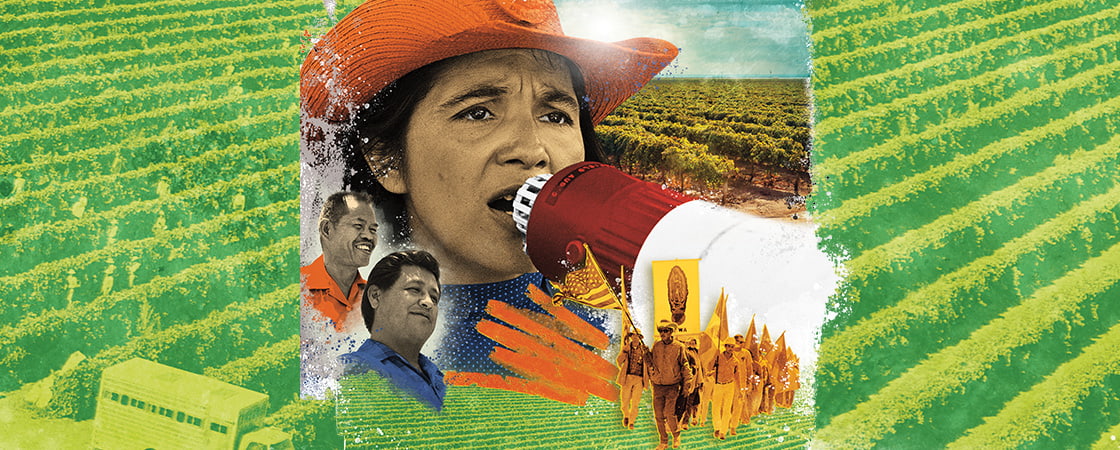The California sun beat down on seemingly endless rows of grapevines. Kneeling in the dirt beside the vines, men, women, and children harvested grapes in the blazing heat.
Snip. Snip. Snip.
With small metal clippers, they cut bunches of green and purple grapes and packed them into wooden crates. It was painstaking work. Gnats bit their skin. Sweat soaked their shirts. Their bosses pushed them to move faster.
It was September 1965, and harvest season had arrived in Delano (duh-LAY-noh), California. The agricultural town had a booming grape business. Delano and the surrounding communities produced almost 300,000 tons of grapes each year. In 1965, that haul was worth nearly $27 million—more than $260 million in today’s money. Grapes from Delano were shipped all over the world, from New York City to Hong Kong.
But the people who picked those grapes earned barely enough for food and housing—and they worked under brutal conditions. Out in the fields, there was no cold drinking water. There were no toilets where they could relieve themselves in private. The vineyards were sprayed with toxic chemicals, called pesticides, to control bugs. The pesticides sickened workers.
Yet no one dared complain. If they did, they could be fired.
Suddenly, the workers heard a commotion. They looked out at the dusty road beyond the fields. A dark-haired woman with a megaphone was standing on top of a car. She shouted at the pickers to stop working until their employers began treating them better.
Then she yelled a single Spanish word: “Huelga!”
“Strike!”
The woman was Dolores Huerta, and she was asking the pickers to take a huge risk: to put down their clippers and walk out of the field.
The California sun beat down on rows of grapevines. Men, women, and children knelt in the dirt beside the vines, harvesting grapes in the blazing heat.
Snip. Snip. Snip.
They used small clippers to cut off bunches of grapes. They packed them into wooden crates. It was painstaking work. Gnats bit their skin. Sweat soaked their shirts. Their bosses pushed them to move faster.
It was September 1965. Harvest season had arrived in Delano (duh-LAY-noh), California. Delano and the surrounding communities produced almost 300,000 tons of grapes each year. In 1965, that haul was worth nearly $27 million. That’s more than $260 million in today’s money. The grapes were shipped all over the world, from New York City to Hong Kong.
But the people who picked those grapes earned barely enough for food and housing. And they worked under brutal conditions. Out in the fields, there was no cold drinking water. There were no toilets where they could relieve themselves in private. The vineyards were sprayed with toxic chemicals, called pesticides, to control bugs. The pesticides sickened workers.
Yet no one complained. If they did, they could be fired.
Suddenly, the workers heard a noise. They looked out at the dusty road beyond the fields. A dark-haired woman was standing on top of a car. She had a megaphone. She shouted at the pickers to stop working. She wanted their employers to treat them better.
Then she yelled a single Spanish word: “Huelga!”
“Strike!”
The woman was Dolores Huerta. She wanted the pickers to take a huge risk: to put down their clippers and walk out of the field.



